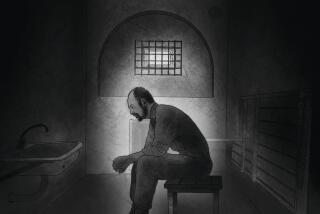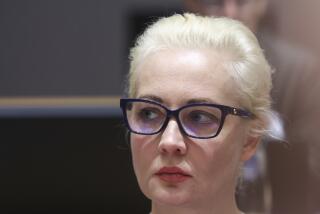From the archives: Power Ends for Dictator, Wife Amid Chaos
WARSAW -- Nicolae Ceausescu’s monster was dying monstrously Friday.
As his 24-year-old dictatorship in Romania careened into its final blood-soaked days, Nicolae Ceausescu, along with his wife Elena, his son and his network of family retainers, probably realized they could expect little mercy or sympathy from 23 million Romanians who have endured a despotism that, at the last, seemed to slip into outright madness.
The end of power for the Ceausescu family came amid blood, flames and chaos. In one swift, delirious and terror-filled day, the Ceausescus fled in the morning by helicopter from a presidential palace that was ablaze at nightfall. Gunfire from Ceausescu’s dreaded Securitate, his Praetorian Guard of secret police, raked the streets, directed at crowds that had gathered to celebrate. These gunmen, the once all-powerful enforcers of Ceausescu’s strange concept of “socialist progress,” were left amid the rubble of his vision.
It was a frightful climax, and it was all the creation of Nicolae and Elena Ceausescu. Or, as Romanians called them, Him and Her.
They were the architects of a security apparatus the likes of which, experts say, was rivaled only by that of Kim Il Sung in North Korea. It was a security apparatus that was built up alongside the military, which it outnumbered, most estimates say, 700,000 to 180,000. It employed prostitutes and bellhops and eavesdroppers of every description--professional and amateur--as well as bodyguards and thugs. It was a system, as a frightened Romanian woman told a reporter two years ago, that was based on sickness.
“We are all becoming sick here,” she had said. “All of us. All of us except the ‘new man’ and ‘new woman’ “--she meant Ceausescu’s vision of a new socialist humanity--”maybe them most of all.”
Ceausescu’s new socialist humanity lived, for most of the last decade, at the center of a huge national lie, the focal point of which was the fiction of public adoration for Ceausescu himself, for his ubiquitous six-foot portraits and bannered slogans, his endlessly televised (and carefully staged) tours of factories, his scheme to bulldoze about 20% of Bucharest into oblivion to make way for a grand avenue of government buildings, his increasingly pitiful attempts to portray himself as an international statesman and peacemaker.
In the midst of all this, Romanians have lived since the early 1980s at a level of privation that is unique in Europe. In a drive to retire an international debt of $11 billion and thus free himself from any outside pressure, Ceausescu deprived his people of food, heat and light.
Two winters ago, Romanians in Bucharest lined up for hours to buy plastic bags of chicken feet, or, if they were lucky, a chunk of unspeakable gray sausage. The rest of the chicken, so far as anyone knew, was sent out for export, to raise money to retire the national debt.
The markets were not only barren of meat. Potatoes were virtually nonexistent. Employees at state-owned supermarkets tossed into the display cases frozen bundles of carrots and other root vegetables, mixed with small chunks of pork fat. Customers could buy these or go hungry.
Ceausescu’s legions of official explainers, such as the editor of the party newspaper, Scintea, would tell visitors that this wasn’t a real problem: Romanians have a penchant for hoarding food at home. And not only that, the straight-faced editor said, they are chronic overeaters.
In 1987, when Soviet President Mikhail S. Gorbachev came for a visit, a supermarket was stocked full for his approval. When the limousines pulled away, police could not control the crowds that stormed the market to get at the food.
In the winter, Romanians were allowed 35 kilowatt hours of electricity, resulting in rooms dim with 40-watt bulbs. Power usage over that limit resulted in electricity bills that exceeded the average monthly pay. The city of Bucharest, with nearly 2 million inhabitants, was blacked out at night like a city at war, with only every fifth street light turned on.
The resulting gloom was fittingly sinister. Foreign visitors, especially journalists, were conspicuously followed. Watchers were everywhere. As in some heavy-handed movie portrayal of a police state, agents eavesdropped from behind the potted palms in hotel lobbies, lurked in shadowed doorways, listened in on bugged telephones. They were, of course, meant to be conspicuous, for that was an intended element of fear, and fear was the controlling mechanism for Ceausescu’s march toward “socialist perfection.”
By and large it worked. No organized opposition was allowed to form. Instead, individual human rights activists--such as Doina Cornea of Cluj, a fired university teacher, and a handful of former government officials placed under house arrest--persisted in efforts to get the truth to the outside world.
Elena Ceausescu, dour-faced, her graying hair swirled in a towering beehive, was said to have been given special control of the Securitate. It was an authority she especially enjoyed, according to at least one defecting Romanian agent, who told of her special interest in the tape-recorded sexual exploits of ranking members of the Communist Establishment, provided to her by the secret police.
Family members were seeded throughout the government and the party, a ring of nepotism, protection and corruption that was meant not only to ensure loyalty but, most Romanians believed, was aimed at establishing a dynasty. As of Thursday morning, eight of the 10 members of the ruling Politburo were members of His family or Hers.
Favored son Nicu Ceausescu, 39, known as a hard-drinking playboy, was a candidate member of the same body, and was installed as the party chief in Sibiu County (whose security forces he reportedly took command of Thursday morning). He was captured Friday by reformist forces and displayed on national television.
Nicolae’s brother Ilie was a deputy defense minister. Another brother, Nicolae Andruta, was deputy interior minister. Still another brother, Ion, was in charge of economic planning.
Altogether, members of the Ceausescu family held around 50 top posts in the government and the party.
Ceausescu came to power in Romania in 1965, and for the first 15 years of his rule, he was regarded as a unique and interesting maverick in the Communist world. In 1968, he won some points in the West by refusing to join in the Soviet-led Warsaw Pact invasion that put down Czechoslovakia’s Prague Spring uprising. He formed independent links to China when it was unfashionable in the European Communist world to do so, and, alone in the Soviet Bloc, he maintained relations with Israel.
Ceausescu took advantage of the role, in effect playing both ends against the middle. In 1975, the United States, willing to encourage his rogue tendencies in the East Bloc, granted Romania its special most-favored-nation trade status.
Meanwhile, he traveled the globe, trying especially to establish himself as a Middle East peacemaker. His public relations mill churned out about 150 books under his name, promoting his image as a builder of world peace. In 1978, he was invited to spend the night in Buckingham Palace and was granted an honorary knighthood by Queen Elizabeth II.
The queen, on the advice of the Foreign Office, retracted the honor Thursday, as she had been under pressure to do for some time. It had long since become an embarrassment to the British.
As the year’s stunning events in Eastern Europe echoed around him, Ceausescu stood firm. At his command, the Romanian Communist Party even sent a secret telegram to the Polish Communists after their abject defeat in elections last June. The communication proposed that the Polish Communists join in a vaguely defined joint military effort to overturn the election outcome if they so desired. They did not, and eventually the communication leaked out. Ceausescu was not embarrassed, however.
Then he proposed a rejectionist front, trying to form a coalition with such other hard-line Communist states as Albania, Cuba, North Korea and China--a regime that, as his own regime eventually was to do, resorted to brute force in the effort to stamp out the reformist rot. There were no takers.
At a party congress in November, he spoke for five hours without a break before the obedient throngs of party apparatchiks, who stood again and again, on cue, to deliver sustained applause. Even then, with the Berlin Wall fallen and the last few hard-line governments crumbling around his borders, it was clear that Nicolae Ceausescu felt too confident to go the way of weaker neighbors. His very endurance at the podium, not to mention his determined words, conveyed his blind belief that all was well, that he, his wife, his family and his carefully constructed system of control, were different--and would prevail.
The confidence seemed to last until the end. Television footage of his appearance before a crowd in Bucharest on Thursday showed him with a look of near-amazement on his face as he lifted his hands, palms downward, as if in a gesture aimed at calming the sea, trying to silence the taunts of a crowd that would hear no more.
He seemed utterly stunned that such a thing could happen. He even tried again Friday morning, sketchy reports from Bucharest said, as he appeared on the balcony of the palace, tried to speak and was met with shouts of “Death, death!”
The Ceausescus went then to the helicopter waiting on the roof, and began their panicked journey in search of a plane to fly them out of the country, probably to North Korea or China.
More to Read
Start your day right
Sign up for Essential California for news, features and recommendations from the L.A. Times and beyond in your inbox six days a week.
You may occasionally receive promotional content from the Los Angeles Times.






